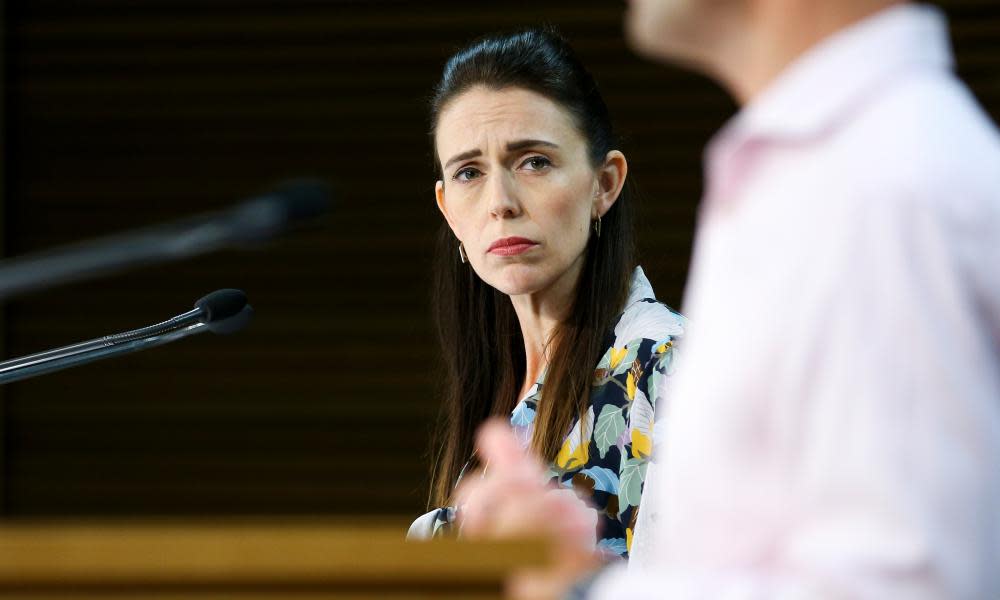'Everyone is angry': Ardern under pressure over latest Auckland Covid lockdown

New Zealand’s prime minister, Jacinda Ardern, has reprimanded rule-breakers over the recent cluster of coronavirus cases, leading to further restrictions for Auckland.
The city re-entered lockdown with level-three restrictions in place for at least a week from Sunday following the discovery of a community case of unknown origin.
Health officials investigating over the weekend successfully established that the person, known as Case M, had been infected through contact with a family counted among the recent Papatoetoe cluster.
The meeting had occurred during the snap three-day lockdown in Auckland last month, and had not been disclosed to contact tracers interviewing the family (Cases D to H) prior to their entering quarantine.
Related: Words matter: how New Zealand's clear messaging helped beat Covid
At a press briefing on Monday afternoon, Ardern said breaking the rules was unacceptable and that those who had done so were “facing the full judgement of the entire nation”.
Watch: New Zealand in lockdown as U.K. variant reported
Ardern said the government’s Covid response was multi-layered, but nonetheless depended on everyone’s participation, not only in complying with the rules, but ensuring that others did the same.
“Even with the full understanding of human fallibility, it is not appropriate and it is not OK for members of the team of five million to let the rest of us down …
“That is why I am asking everyone, now more than ever, to continue to back and support one another, and if that means calling a family member or work colleague out for not following the rules, then we should do that.”
Case M, a 21-year-old tertiary student, is the older sibling of a pupil at Papatoetoe high school, which has been at the centre of the February outbreak.
Case M had previously returned three negative test results but is regarded to have been potentially infectious since Sunday, during which period they visited several public venues.
Their mother, Case N, has also tested positive for Covid-19, taking the total number of active community cases to 11.
The Auckland lockdown is expected to run the full seven days with the decision to extend, or lower, alert levels to be made as authorities’ investigations into places of interest continue this week. Nearly 200 contacts of Case M have been identified at the Manukau Institute of Technology (MIT) Manukau campus and City Fitness, who are being contacted by public health teams.
Under level-three restrictions, everyone in Auckland is asked to stay at home. The rest of the country is operating at level two.
In the meantime, Ardern’s government is under pressure over how to respond to those who are undermining New Zealand’s Covid response.
The opposition National party is pushing for greater enforcement of self-isolation directives and fines for those who have flouted the rules, with Covid-19 response spokesman Chris Bishop arguing that New Zealand’s “high-trust model” was starting to break down.
“People haven’t felt the pressure to follow the rules because there are no sanctions … We said on 17 February it was a big call to take Auckland out of level three and go down to level two.”
On Monday morning, Ardern had told Radio New Zealand’s Morning Report that it was “obviously very frustrating” that rules had been broken and information withheld, but that the decision whether or not to prosecute rested with police.
The priority was containing this cluster, she said. “Everyone is angry. I absolutely accept that people want to see repercussions. At the same time, how do we make sure people tell us the truth – because there is nothing more valuable to us that knowing in these scenarios where contact has occurred.”
She resisted suggestion that the government’s processes were inadequate, or that it had been premature to end last month’s lockdown after three days. “We were at the right level at the right time – we just needed people to follow the rules.”
Others have urged against a punitive approach given the potential for it to splinter commitment to the lockdown.
Watch: What is Long Covid?
Related: Air New Zealand to trial Covid vaccine passport on Sydney flights
Siouxsie Wiles, a microbiologist at Auckland University, told Radio New Zealand it was important that people felt comfortable coming forward about contact with confirmed cases.
“The last thing we want to do is create an environment where those who’ve broken the rules don’t come forward for testing or mislead the contact tracers about where they’ve been or who they’ve been with.
“We really need people to cooperate to get through this.”
But Manukau ward councillor Fa’anana Efeso Collins told Stuff that the burden of New Zealand’s coronavirus response was now being shouldered by South Auckland communities, without adequate engagement or support.
“I can see we’re slowly moving into the post-kindness phase, where instead of being a team of 5 million, we are hearing that people just need to be compliant,” he said.

 Yahoo News
Yahoo News 
